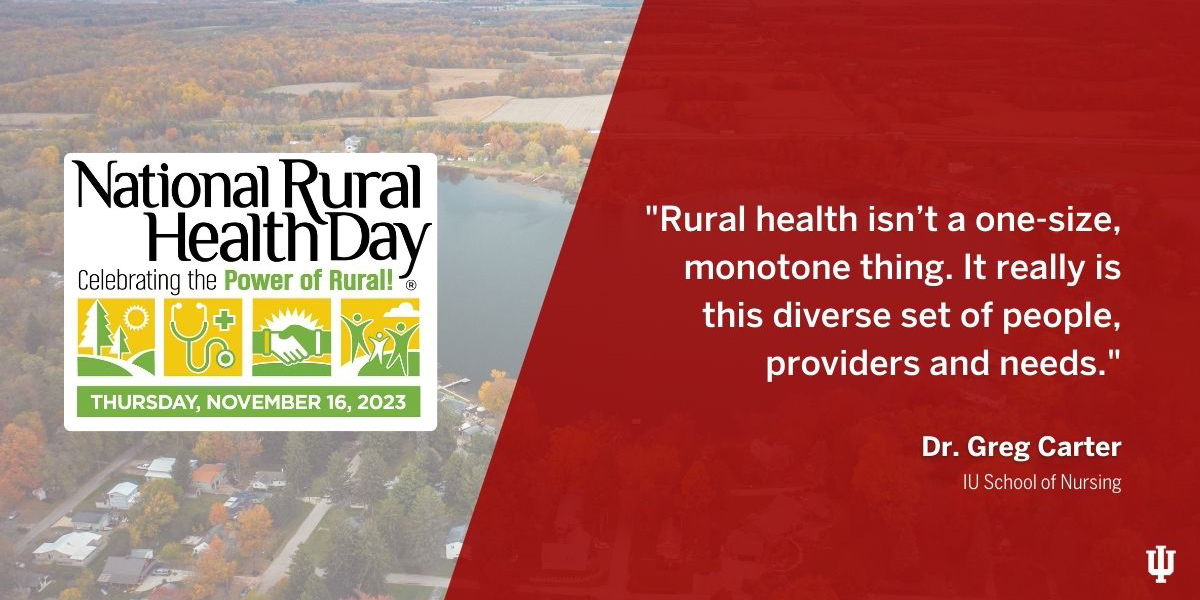The shortage of health care workers is causing difficulties for millions of people to receive needed health care services throughout the United States, but those living in rural communities feel the issue most severely.
Even in urban areas, access to health care can be limited due to a shortage of primary care providers and other essential health services. Still, health care deserts have been most prevalent in rural areas in Indiana for decades, and many areas are seeing services disappear at a rapid rate as established health care systems are closing departments – and sometimes entire locations – due to a lack of available providers.
The shortage isn’t the only health care issue affecting those who live in rural Indiana, said Dr. Greg Carter, an assistant professor at the IU School of Nursing with expertise in rural health disparities. It’s a multitude of things, including barriers like financial means to pay for services, transportation, communication, and trust. Many rural areas in Indiana also experience food deserts, or limited access to affordable and nutritious food.
“Rural health isn’t a one-size, monotone thing,” Carter said. “It really is this diverse set of people, providers and needs.”
For example, the rural population of northern Indiana where a percentage of the population is Amish face significantly different health care issues from the rural areas in Southern Indiana where a percentage of the population is Hispanic, Carter said.
Although the Amish population will use modern medicine, many prefer medical treatments that are “natural” over prescription drugs. In Southern Indiana, the Hispanic population – especially those who might be undocumented – may completely avoid health care services due to distrust and worries about immigration status.
Other issues relating to health care exist in these spaces. In some cases, populations in rural communities have extra hurdles, like stigma, to overcome before seeking treatment for mental health or addiction. Language barriers and a lack of diversity in health care providers also can cause adversity.
Even with so many things to address, Indiana health care providers are continuing to make strides by providing new and different options.
Visionary programs like the Southern Indiana Community Health Care, which began in the 1970s following healthcare research at Indiana University’s Regenstrief Institute, have changed Indiana’s rural health care considerably. Each of the seven locations provides a space for “all-in-one” care, including acute and chronic medical care, dentists, pharmacists, mental health counseling and more.
In many cases, the same doctor who cares for a patient as an infant will care for the patient as they grow into adulthood, something that is rarely seen anywhere else across the country.
Carter noted telehealth options – or talking with a health care provider live over the phone or by video chat – increased during the Covid pandemic and continues to improve access to health care for Indiana’s rural populations.
The IU School of Nursing – which is among the largest nursing schools in country – not only addresses workforce needs by educating future nurses but also by preparing students to be critical thinkers and examine patient population in a holistic way, Carter said. In addition to classes, the IU School of Nursing provides unique clinical experiences and outreach programs in many rural communities.
“We need to prepare our students – at whatever level – to work with diverse populations,” Carter said.
Students on the IU School of Nursing’s Bloomington campus positively impact rural health needs while also getting first-hand experience thanks to innovative Regional Health Screening opportunities. These free-of-charge clinics offer the opportunity for patients to receive a robust slate of screenings, including blood pressure, heart rate, blood glucose, and cholesterol, along with healthy lifestyle information, nutrition tips, naloxone kits and even personal consultations based on test results. Other clinic partners offer free pregnancy testing and ultrasounds, as well as testing for sexually transmitted infections (STI), human immunodeficiency virus (HIV), and Hepatitis C.
Clinics like these allow nursing students to better understand the needs of their communities and the diverse patient populations that exist in Indiana, Carter said. Nursing students also can humanize and reimagine what the health care experience can look like for patients they’ll soon meet in a professional setting.
“They just have this broad, amazing education that sets them up to follow their passion, wherever it might take them,” he said.


